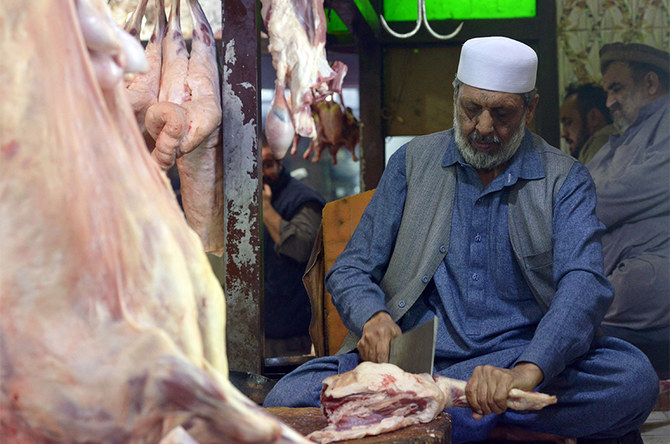KARACHI: Pakistan hopes to export meat and meat preparations worth $500 million by the end of the current fiscal year (FY22) after getting access to the Jordanian and Indonesian halal meat markets, officials said on Monday.
The veterinary and animal health directorate of Jordan’s agriculture ministry allowed three Pakistani meat processing facilities to export bovine, sheep, goat and camel meat to the Arab country last month.
Officials say they are also in talks with the authorities in Jakarta as Indonesia plans to open its market to Pakistani halal meat as well.
“We believe we will be able to export $500 million of meat by June 2022,” Dr. Kausar Ali Zaidi, director general agriculture at the commerce ministry, told Arab News. “Much of our exports go to GCC [Gulf Cooperation Council] countries, followed by Malaysia, Central Asia and now Jordan.”
“Our exports to Indonesia are expected be around $150 million during the remaining months of the fiscal year,” he informed.
Pakistan’s overall exports of meat and meat preparations during the last fiscal year stood at $333.4 million, which was about 10 percent higher than the previous year.
The country has already exported meat and meat preparations worth $78.3 million during the first quarter of the current fiscal year, according to the Pakistan Bureau of Statistics.
Pakistani exporters eye at least 25 percent share in the Jordanian meat market and will help the country add about $100 million in export revenue.
“We hope the trial shipments to Jordan will start from this month [November 2021],” Bilal Shahid Anwar Tata, chief executive officer of Tata Best Foods, told Arab News.
Tata Best Foods is one of the three slaughterhouses approved by Jordanian officials during their Pakistan visit in September. The other two approved facilities are The Organic Meat Company and Tazij Meat and Food.
“Jordan is a good market since its annual import [of meat] stands at about $400-500 million,” Tata said, adding: “It is a big market and big opportunity.”
However, Pakistani official said it would take a little time to gauge the true potential of meat export to Jordan.
“For Jordan, it will take at least two months to estimate how much is going to that country,” Zaidi said, adding: “The trade volume will gradually pick up.”
Pakistani officials informed they were also waiting for China’s response before exporting meat to that country, saying it had been banned due to concerns related to foot and mouth disease.
“We have offered the Chinese to export semi-cooked or precooked meat as heating process kills the virus,” Zaidi said. “We are waiting for their response. If it is positive, it will also open the Chinese market for Pakistani meat.”
He informed that Pakistani companies were getting substantial halal meat export opportunities since some international exporters had been using fake halal certifications.
Earlier in September, The Organic Meat Company secured a $1 million contract to supply frozen boneless meat to Saudi Arabia for 10 months.
The company had also won a high-value contract worth $3.9 million to export 100 tons of frozen boneless meat to Saudi Arabia last December.
















